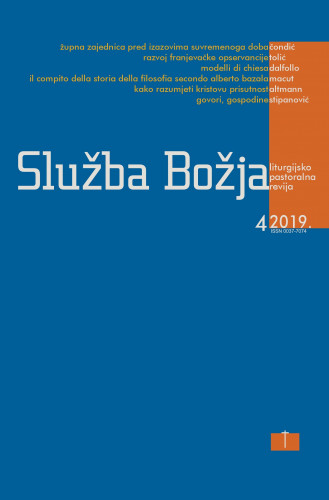U rastućemu kulturnom, etičkom i religioznim pluralizmu župna je zajednica pozvana posvjedočiti svoj identitet i navijestiti evanđelje. U promjenjivomu svijetu, ubrzana životnoga ritma, punog izazova i zamki, smisao župe je voditi ljude Bogu i jedne drugima osluškujući njihove nevolje, radosti i nade, jer konkretni čovjek je uvijek u središtu župne zajednice. Tradicionalnoj župi nužna je metamorfoza, jer u suvremeno doba misionarski oblik župne zajednice otvara se svima i u službi je navještaja, prenošenja i slavljenja vjere u zajednici. U skladu s tim autor razmatra utjecaj društveno-kulturnih okolnosti na razvitak župnoga pastorala, a potom predočuje pastoral i župnu zajednicu u poimanju pape Franje. Isto tako, ističe teološko-pastoralno traženje bitnoga u svijetu, a ono se temelji u otkrivanju načela utjelovljenja, u Isusu Kristu, u kojemu se zrcali smisao ljudske opstojnosti. Na kraju, služeći se metodom pastoralne ili evanđeoske prosudbe, strategiju, odnosno perspektivu župne zajednice u suvremeno doba sagledava i bistri kroz dinamičan pastoralni model triju glagola: integrirati, pratiti i prosuditi.; In a growing cultural, ethical and religious pluralism, parish community is called to witness its identity and proclaim the gospel. In a changing world of a fast paced life, full of challenges and pitfalls, the purpose of a parish is to lead people to God and to one another, listening to their troubles, joys and hopes, because the concrete man is always at the heart of parish community. The traditional parish needs a metamorphosis, because in modern times the missionary form of parish community is open to all and it is in the service of proclaiming, transmitting and celebrating faith in the community. Therefore, the author examines the influence of socio-cultural circumstances on the development of parish pastoral, and then presents the pastoral work and parish communities according to Pope Francis’ understanding. Also, he emphasizes the theological-pastoral searching for the essential in the world, which is based on the discovery of the principle of incarnation, in Jesus Christ, in whom the sense of human existence is mirrored. In the end, using the method of pastoral or evangelical judgment, he perceives and clarifies the strategy, i.e. the perspective of parish community, through a dynamic pastoral model of three verbs: to integrate, to monitor and to judge.
Sažetak

 Služba Božja : liturgijsko-pastoralna revija : 59,4(2019) / glavni i odgovorni urednik Ivan Macut.
Služba Božja : liturgijsko-pastoralna revija : 59,4(2019) / glavni i odgovorni urednik Ivan Macut.